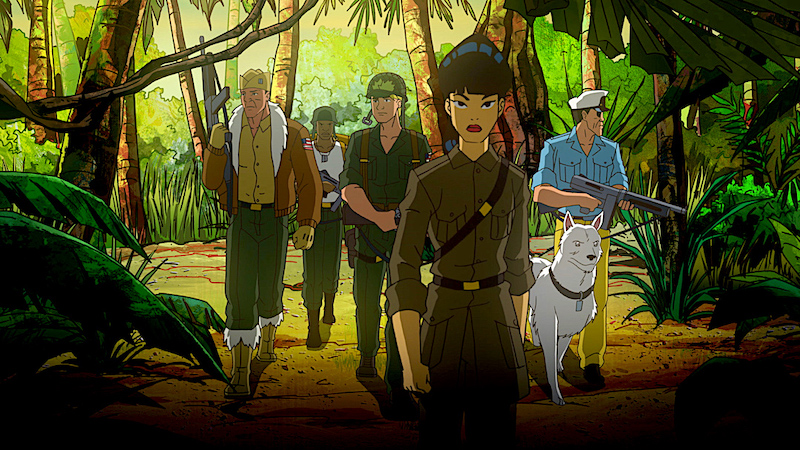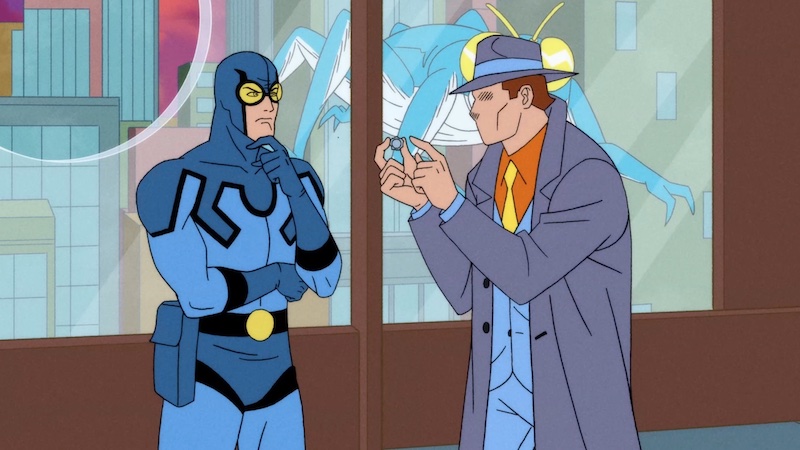ComingSoon spoke with director Milo Neuman ahead of the release of DC Showcase – Constantine: The House of Mystery on Blu-ray on May 3, 2022. Neuman directed both the Blue Beetle and The Losers shorts that are found in the collection.
Alongside the all-new Constantine short, DC Showcase – Constantine: The House of Mystery also features three other shorts in the form of Kamandi: The Last Boy on Earth!, The Losers, and Blue Beetle. All three have appeared in past DC Universe Movies collections as special features, so they aren’t exactly new to fans who may be big fans of the world of DC’s animated features.
RELATED: DC Showcase – Constantine: The House of Mystery Gets Trailer, Release Date
Milo, I know you’ve worked so much on films and TV series in the past as an artist. So what was the biggest challenge about directing, and do you feel like your past work as an artist has really helped you as a director?
Milo Neuman: Yeah. I think I’ve been kind of describing directing as you’re sort of just the king storyboard artist. [laughs], you’re sort of just shepherding all the storyboard artists through the process. And they usually, in animation specifically, they usually grab directors from storyboard artists. That’s typically the trajectory. Because, on the flip side, as a storyboard artist, you’re kind of an assistant director, really. Like, you’re going through beat-by-beat through the script and being like, “This is how this is going to play, these are the shots we’re going to use, these are how the characters are going to be acting.” I mean, as a storyboard artist, you’re making all those decisions anyway, just under the sort, the guide of the director.
So yeah, definitely being a storyboard artist was essential to being a director. The reason I got the directing position at all was because I was working on the Mortal Kombat movies with Rick Morales, who was my producer on the shorts. He just he saw that whenever I would turn in my sequences, they wouldn’t have to change too much. Usually, the storytelling worked, sometimes they were like, “Oh, we have to cut some stuff out,” but usually I was getting it right. Because of that, they were like, “You could probably trust this guy to direct something because he’s got the sensibilities for it.”
You got to show a real range here with these two shorts, and Blue Beetle has this real throwback feel to it. What led to that choice and style?
So the styles for the shorts were sort of decided before I came on. So that was kind of my brief when I started on Blue Beetle was like, “Hey, you’re going to make this short, and it’s going to be in the style of sort of these old superhero cartoons from like, the sixties.” And specifically, I think Spider-Man, we were looking at, I think we looked at the old Spider-Man cartoons a lot, the Ralph Bakshi ones, you know? [laughs] So we were really trying to sort of capture that vibe.
You’re very loose with the humor in Blue Beetle, but it’s just as much an homage as it is a parody of that era. How do you draw that line? So it’s not like you’re mocking those classic cartoons.
Yeah. I mean, I think you’re relying on people’s affection for those cartoons to some degree. I think people love those cartoons, people have a lot of affection for them. So I think if you go into it and when you put in a little animation mistake, that is something so specific to a specific era, I don’t think people see it as mocking. I think people usually will see that as like, an affectionate homage and they’ll laugh because yeah, it’s nostalgic, but also it’s pretty funny. Some of these mistakes are funny and I think for us, I think we had a lot of respect for the fact that the stuff we were kind of making poking fun at in Blue Beetle was really like, that was people doing their best in the sixties because there were limits to the technology that they had.
It was hard too when you were animating something in the sixties. It was like…you would have to shoot it, and then it would have to go off and be developed and you wouldn’t even see if it looks good until like a week later. So, it was all guesswork on those old cartoons and they were under such a crunch. The reason they did so much reused animation was because they had no time. They had to crank out these episodes so quickly. So, all these little mistakes, accidents, and weird stylistic decisions would happen just as a result of necessity, and, it kind of created a style. Maybe partially, accidentally [laughs] and that kind of accidental style is sort of what we were trying to do deliberately. It was an interesting challenge. But I think the people can see that that effort. That effort to try to recreate that and I think that people will resonate with that.
Yeah. It’s awesome. I love the little mistakes, like the Blue Beetle talking a bit while other person is talking. You see his mouth moving, it’s really fun.
All that stuff needed to be done very deliberately.
This stars the Ted Kord version of Blue Beetle. This is really like a Silver Age era character and perfect for the timeframe you’re going for, but what did you find most interesting about him?
I think in the context of our short, I think it was good to have him as this sort of like upstanding everyman hero to contrast with The Question who is, again, this sort of like cold, intellectual [Ayn] Rand-ian weirdo, you know? I think that part of the fun was playing those two off each other, honestly. For me anyway, that’s what I found very appealing about it.
Yeah. I love just how Objectivist you took him.
Yeah, I like that we leaned into that. [laughs]

Then you have The Losers here. What was your familiarity with that franchise before working on this?
Really just the Darwin Cook comic, The New Frontier, because they appear in the prologue of that one. And I think that’s how most people nowadays kind of know them. But yeah, I love that comic. That’s like, that is one of my all-time favorite superhero comics, so I was excited to get to play around with them and I was excited that we got to do kind of a dinosaur island adventure with them, because that actually isn’t traditionally what The Losers did in their comic.
They were more of like, a World War II kind of team-up adventure comic. So they were fighting Nazis, they were in the Pacific or whatever. They were doing World War II adventures [laughs]. But there were other comics of a similar era where it was, sort of generic, World War II soldiers fighting dinosaurs on like, weird islands and stuff. I think Darwin Cook kind of took those two concepts and smushed them together, and we ended up doing the same thing because of, course that’s how people know them now. Not a lot of people are still familiar with those old comics.
You mentioned Dinosaur Island, I thought that was such a cool locale for this because that DC location has such a long history in its own right. You get to explore so much of the rich history of DC in both of these shorts here. How great is it just digging into that back catalog and maybe introducing some people to these characters that they might not be super familiar with?
I think it’s really fun. I think that’s part of the, that really is the fun of the shorts. Because I think with the [direct-to-video films], I think it is a little bit more considered what we’re going to do, because they take longer to make and they’re a little bit bigger budget. But I think with the shorts because they’re so small scale, we can just take a character and have fun with it, you know? That’s great. It’s very liberating, and I think that’s part of the reason we were able to be so stylistically diverse with all these shorts too. We really tried to make sure each were kind of matched in some way, the style of the old comics. I know that was a major concern of Rick’s when we were going into doing all this. So yeah, no, it was great.
Specifically with The Losers, 13 minutes is not a ton of time to tell a really meaningful story and to kind of introduce these characters. So what were the challenges of fitting in a whole arc of the story within such a small amount of time?
Yeah, it was tough. I mean, I remember, Blue Beetle was pretty fully-formed. I think we didn’t deviate much from the script, I think with The Losers, that was one where we were kind of working to get the script, from the second I was in the door, we were talking about, especially the third act of the short, just trying to bring everything together in a satisfying way, that was pretty challenging on that one.
We actually had extra…the cast was a little bigger originally. I think there was a character, and I can’t remember her name, but she…I don’t remember her name, but she was part of the team, and we ended up cutting her just because she didn’t really do much, and she didn’t really contribute. She had like, no beats of her own in the script. She just had a lot of various lines of dialogue [laughs] and so we were like, “We could just pull her out and give her dialogue to some of the other characters and this might all like, flow a little better, and be a little simpler.” So that was, that was a decision that got made pretty early on. But then the end of the movie, we were wrestling with that all the way up until the very end, trying to get that right.
We ended up at a certain point, kind of going off script a little bit and just sort of boarding something not entirely off script, we kept most of the dialogue, but we kind of really messed around with that last bit to get the action of it to work. Just to make it tense and exciting, all that stuff with the characters getting cornered by the T-Rex, that wasn’t really how it was, how it was staged in the script. So we had to kind of take some liberties to work right. But that’s just how it is making these [direct-to-video films] and these shorts usually everyone’s…the writers are making their best guess. And then, we’re getting to our part of the thing, and kind of making our best guess at what’ll make a good movie, and it kind of just passes along, one person to the next, until the thing’s done.
Are there any dream DC characters, especially obscure ones, that you’d want to work with in the future?
Oh, uh, man, let me think. Not obscure…I mean, I would love to do a Superman thing at some point, but that’s like the least obscure thing you could possibly say. But, I’m not sure about obscure, I’d have to think about that more [laughs]. But yeah, no, I mean, I would love to do one of these shorts again, though. Any character they want throw at me, that’d be fun.






